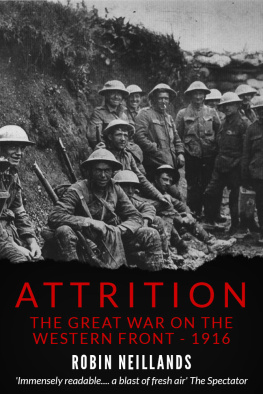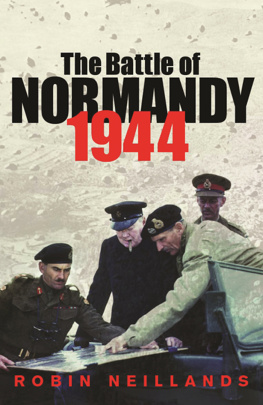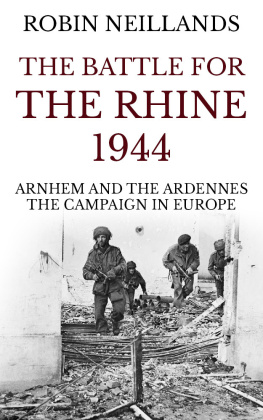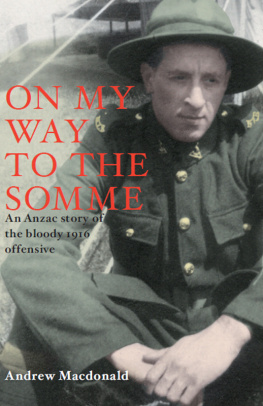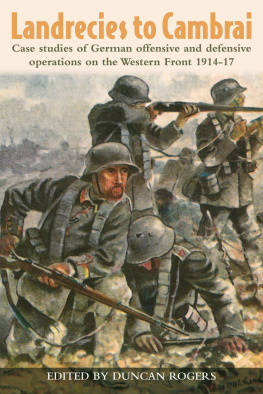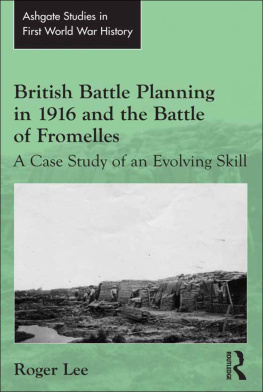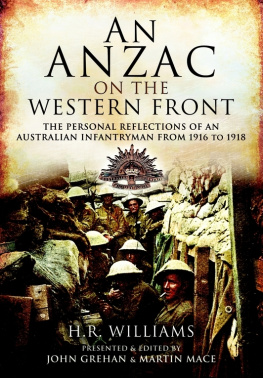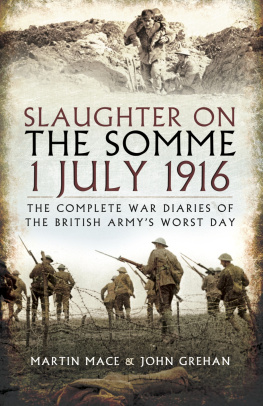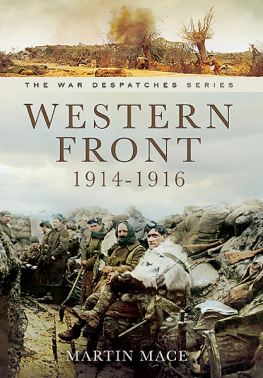ATTRITION
The Great War on the Western Front, 1916
Robin Neillands
Robin Neillands 2013
Robin Neillands has asserted his rights under the Copyright, Design and Patents Act, 1988, to be identified as the author of this work.
First published by Robson Books in 2001
This edition published in 2018 by Lume Books.
This one is in memory of Colin Fox
'But war's a game, which, were their subjects wise, Kings would not play at.'
William Cowper, 'The Winter Morning Walk', The Task, 1785
Table of Contents
Acknowledgements
A great many people helped me with this book. My thanks go first to those who set me on the trail of this story, the branch secretaries and members of the Western Front Association, for giving me the idea and providing both useful criticism and some very detailed information on different aspects of the Western Front; whatever you need to know, some member of the Western Front Association will have the information, and my thanks to them all.
I must then thank my critical readers, those who read the book in its various drafts, checked the facts, queried my opinions and voiced doubts that I have sometimes been able to answer in the text - a process known as 'Getting your retaliation in first.' My thanks therefore to Group Captain Drury-Bird, Major-General Julian Thompson, Colonel Terry Cave and the late and much-missed Colin Fox. Without Colin this book would not have been started, for he put the idea of writing about the Western Front into my head and was a constant supporter and critic of the work as it progressed.
Beyond that thanks go to Terry Brown, for his company on many visits to the Western Front, especially Verdun and the Somme; to the staff of the Muse Historial in Pronne; the staff and guides on the Verdun battlefield; Simon Robbins and Lawrie Milner at the Imperial War Museum; the Submarine Museum, Gosport; Andy Robertshaw at the National Army Museum; William Spencer at the Public Records Office; the RAF Museum, Hendon and the Wiltshire County Library Service. And, finally, to those many visitors I talked to on the Western Front in recent years, people who walked the ground, visited the cemeteries and raised the great question: After what happened here , and at such a cost , why was it allowed to continue ? I hope that at least part of the answer is provided in the pages which follow.
About This Book
'It is not for the historian to accuse or defend.
His duty is to establish facts and to marshal
them in the sequence of cause and effect.'
Fritz Fischer, Foreword to Germany's Aims in the First World War
It would be pleasant to think that, somewhere in the world, there flows a stream of good, novel and interesting ideas, available to writers seeking a subject for their next book. Alas for authors, it rarely works out like that. Worthwhile, viable ideas are always hard to find, come from a number of sources and often arise from matters touched on in the previous book - or from the comment that book causes.
That is certainly so in this case. The origins of this book lie in a series of lectures I gave to branches of the Western Front Association in various parts of Britain during 1999-2000, talks based on the subject of my previous First World War book, The Great War Generals on the Western Front . In that book I attempted to demonstrate that the cause of the disasters on the Western Front during the Great War had a rather wider base than that fixed on by the public at large: the incompetence and callousness of the generals - especially the British generals - charged with the planning and management of the fighting on that front.
This argument was usually well received, but on a number of occasions during these lectures I was asked why Haig and Rawlinson, the overall commander in France and the general most closely concerned with the first phase of the battle, had agreed to attack on the Somme in 1916. Surely, said the questioners, the decision to assault this German bastion and so precipitate a battle which, after a disastrous first day, continued for months and cost so many lives for so little territorial gain, shows that these British generals must have been incompetent?
The short answer to that particular question is that the 1916 Somme offensive had been planned as a combined offensive by the French and British commanders, Generals Joffre and Haig - with Joffre, the generalissimo , as the prime mover - and this offensive was placed astride the River Somme because that was the place where the positions of the French and British Armies met and the French generals, specifically Joffre and Foch, could therefore dictate the progress of events.
However, even as I pointed that basic fact out, time and again during those lectures, I began to wonder if there was not more to it than that. After all, when the German Verdun offensive opened in February and continued unabated into the summer, the French contribution to the combined Somme attack inevitably declined ... so why did not Haig abandon this 'combined offensive' and switch the British attack to his much-preferred ground in Flanders and the Ypres salient? If that course did not appeal, why, given the nature of the German defences, did Haig not wait until the tank was available to breach them? Clearly, the question of the 1916 offensive needed more investigation ... but where to start?
One can start by dismissing some of the more absurd suggestions. Liddell Hart has suggested that after the failure of the First Day on the Somme, Haig should have switched his offensive to Messines, on the edge of the Ypres salient some 60 miles to the north. As Major-General Julian Thompson has remarked:
Forget about the political effect of pulling out of an Anglo-French operation. Just consider the logistics. In order to mount the Somme offensive, the British laid 55 miles of fresh railway track, leaving only ten miles of track available and unused. In the event, the Messines offensive in 1917 required the laying of 90 miles of railway track as well as the transport of ammunition for 1,314 guns which, in one week of the Messines offensive, fired 3,258,000 rounds of all calibres.
In short, if the Somme operation was a mistake, that mistake had to be realized long before the men went over the top on July 1; after the battle was joined it had to be fought until some outcome was established ... but what sort of outcome might that be? (1)
The best place to start the study of any particular battle or campaign is at the beginning, with the decision to attack. This decision is not always in the hands of the generals, for the politicians will have their say, but the first question that has to be asked is, was the decision to attack on the Somme fundamentally wise? Did General Haig even want to attack on the Somme, which was a new area of operations for the British Army, on a part of the line only recently taken over from the French?
If not, then why did Haig agree to the combined offensive in the first place and, rather more to the point, if he did not want to attack there, why did he persist in doing so after the German attack at Verdun made it increasingly clear that his French Allies would not be able to play their promised part in the battle? Would it not have been wiser, as so many now assert, to give up the Somme campaign entirely and revert to an attack out of the Ypres salient, where the strategic advantages - in the event of success - were much more obvious? Questions, questions ...
These were good questions, more would follow from them and I had no idea of the answers. I therefore decided to find out, and the result is this book. In the course of researching it the project has expanded somewhat, not least after the discovery, or realization, that the story did not start with the decision to mount a combined offensive; it started with the reasons for mounting a combined offensive and that had to include a number of other issues, like stopping the war altogether. To get to the bottom of the problem I would have to go back to the very start of the war and see how the war and the armies that fought it had changed, from the time the war opened to the critical year of 1916.
Next page
